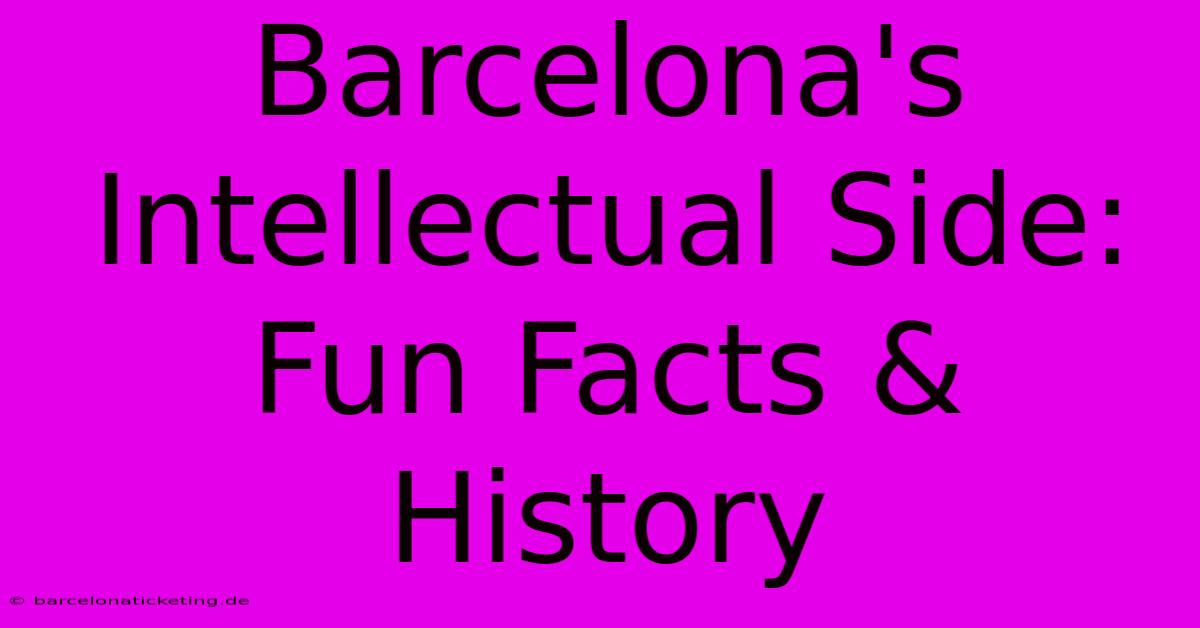Barcelona's Intellectual Side: Fun Facts & History

Table of Contents
Barcelona's Intellectual Side: Fun Facts & History
Barcelona, a city renowned for its vibrant culture, stunning architecture, and lively atmosphere, also boasts a rich intellectual history often overshadowed by its more flamboyant reputation. Beyond the beaches and bustling plazas lies a city that has nurtured groundbreaking thinkers, artists, and innovators for centuries. This article delves into the fascinating intellectual side of Barcelona, uncovering fun facts and exploring its historical significance.
A City of Philosophers and Thinkers
Barcelona's intellectual heritage isn't just a recent phenomenon; it stretches back centuries. The city's strategic location on the Mediterranean, a crossroads of cultures, fostered an environment conducive to intellectual exchange and innovation.
The Influence of Catalan Identity:
Catalan culture, with its strong sense of identity and language, has been a crucial factor in shaping Barcelona's intellectual landscape. The revival of the Catalan language and culture in the 19th and 20th centuries fueled a renaissance in literature, art, and philosophy, producing figures who championed Catalan nationalism and intellectual independence. This cultural pride continues to influence the city's intellectual scene today.
Early Influences: Universities and Enlightenment:
The establishment of the University of Barcelona in 1450 played a pivotal role in fostering intellectual growth. Over the centuries, the university became a center for learning and debate, contributing significantly to the city's intellectual development. The Enlightenment period, with its emphasis on reason and progress, also had a profound impact, shaping the philosophical and scientific discourse in Barcelona.
Barcelona's Modern Intellectual Legacy
The 20th century saw Barcelona emerge as a hub for avant-garde movements. The city's intellectual landscape was significantly shaped by:
The Modernista Movement:
Barcelona's stunning Modernista architecture, exemplified by Antoni Gaudí's masterpieces, wasn't just an aesthetic achievement; it reflected a broader intellectual movement. The Modernista style, characterized by its intricate details and organic forms, was a testament to the city's creative energy and intellectual ambition. Thinkers and artists explored new ways of expressing themselves, pushing the boundaries of design and art. Gaudí himself was not just an architect but a visionary who integrated philosophy and symbolism into his creations.
The Impact of the Spanish Civil War:
The Spanish Civil War (1936-1939) had a profound impact on Barcelona's intellectual life. The city became a battleground, and many intellectuals were forced into exile or faced persecution. Despite the devastation, the war also galvanized a renewed commitment to social justice and progressive ideals among intellectuals who survived the conflict.
Post-Franco Era and the Rise of Catalan Nationalism:
Following the death of Franco, Barcelona experienced a cultural and intellectual resurgence. The revival of Catalan language and culture led to a flourishing of intellectual activity, with writers, artists, and philosophers exploring themes of identity, nationalism, and social justice. This period saw a re-evaluation of Catalonia’s place within Spain and its own unique identity.
Fun Facts about Barcelona's Intellectual Life:
- Did you know? Barcelona has a surprisingly high number of libraries and bookshops per capita, reflecting the city's passion for reading and learning.
- Hidden Gem: Explore the hidden courtyards and gardens of the Gothic Quarter, once frequented by intellectuals and artists. They are a testament to the city's layered history.
- A City of Debate: Barcelona’s streets buzz with passionate conversations, and the city is known for its lively intellectual debates, in cafes, plazas and cultural venues.
Conclusion: More Than Just a Tourist Destination
Barcelona's intellectual side is a fascinating and often overlooked aspect of the city's rich tapestry. From its early universities to its role as a center for Modernism and Catalan nationalism, Barcelona has consistently nurtured intellectual growth and innovation. By understanding this intellectual heritage, we gain a deeper appreciation for the city's unique identity and its enduring contribution to the world. The next time you visit Barcelona, remember to look beyond the surface and explore the fascinating intellectual legacy that shapes this vibrant city.

Thank you for visiting our website wich cover about Barcelona's Intellectual Side: Fun Facts & History. We hope the information provided has been useful to you. Feel free to contact us if you have any questions or need further assistance. See you next time and dont miss to bookmark.
Featured Posts
-
Barcelona Model Reimagine Your Urban Planning
Apr 08, 2025
-
Fun Facts About Barcelonas Underground Scenes
Apr 08, 2025
-
Fun Facts About Barcelonas Unique Street Names
Apr 08, 2025
-
The Barcelona Model Building A More Resilient City
Apr 08, 2025
-
Fun Facts About Barcelona Everything You Need To Know
Apr 08, 2025
